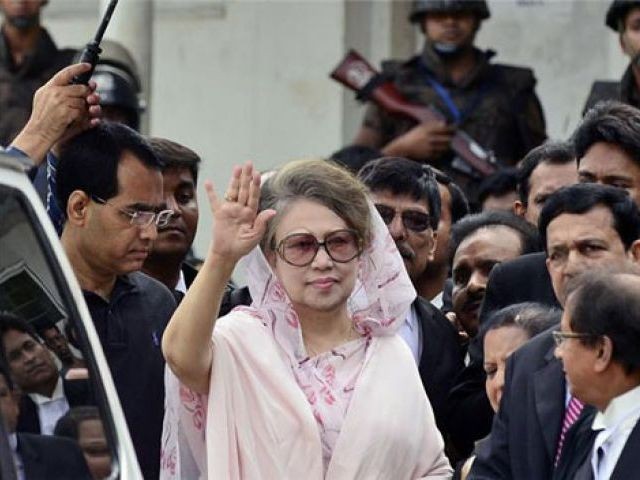Bangladesh opposition leader Zia granted bail

Agency
May 16, 2018

DHAKA –Bangladesh's 72-year-old opposition leader Khaleda Zia was granted bail on corruption charges Wednesday after her lawyers argued her health was at risk, paving the way for her to be released from jail.
Zia was imprisoned in February after being accused of embezzling money intended for an orphanage, an allegation she said was politically motivated.
Bangladesh has for years been locked in an epic showdown between Zia, who has served as prime minister three times, and her arch-rival, current leader Sheikh Hasina.
In a unanimous ruling, the Supreme Court upheld a lower court's decision to grant Zia bail while she appeals against the five-year jail term, her lawyer Joynal Abedin told AFP. She faces several other charges and it was not immediately clear when she would be released from the special jail in the capital Dhaka where she is the sole inmate.
Zia's lawyers said they told the court that she faced serious health risks if kept in prison and that she would be treated at a top private hospital once she is released. "She has become very sick due to long solitary confinement," Abedin said, adding that Zia suffers from a neurological problem, arthritis and night-time fever.
- Elections loom -
The Supreme Court had earlier suspended the lower court's decision to grant Zia bail, prompting her Bangladesh Nationalist Party (BNP) to condemn the move as part of a campaign by Hasina to silence the opposition ahead of looming national elections.
Zia faces more than 30 other inquiries related to violence and corruption. Abedin said she was officially considered under arrest in at least six other cases and needs to get bail for each one, which may take days or weeks. However, the Supreme Court ruling is likely to have an influence on those proceedings.
"We hope she will be released shortly. These cases do not have merit at all. These are all politically motivated cases," Abedin said.
Mohammad Shamsuzzaman, an orthopaedic specialist at Dhaka Medical College Hospital, visited Zia last month as part of a four-member government team. He said her condition was not serious but that she had developed back pain and her arthritis had worsened in prison.
"She has pain in hands and legs. She couldn't walk 50 metres without assistance," he told AFP. Violence erupted in major cities across Bangladesh after the guilty verdict against the BNP leader was handed down in February, with her supporters clashing with police and activists from the ruling party.
Zia, who entered politics in the 1980s after her military dictator husband was assassinated in a failed coup, has consistently dismissed the charges as politically motivated.
Her party boycotted 2014 national elections in which Hasina was re-elected but is expected to contest the new polls due in December. In March a report by German think-tank the Bertelsmann Foundation listed Bangladesh as a new autocracy, raising doubts about the credibility of the country's elections.
The ruling Awami League has rejected the assertion. Zia and her son were detained by an army-backed government in 2007 and spent a year and a half in detention pending trials for alleged corruption.
---


Leave Comment